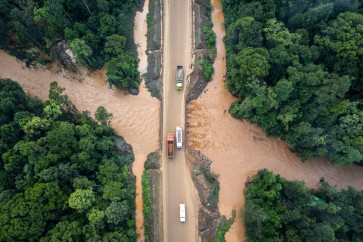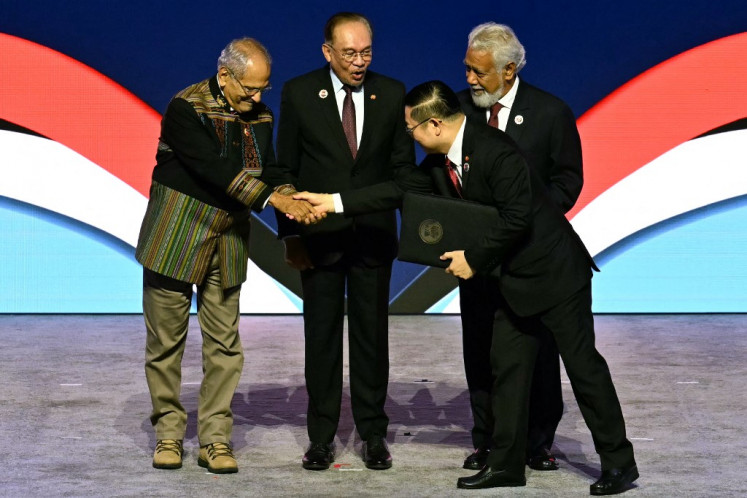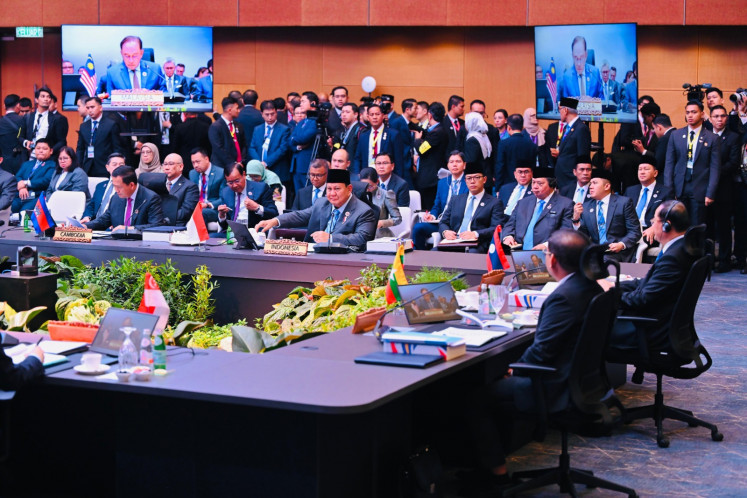Popular Reads
Top Results
Can't find what you're looking for?
View all search resultsPopular Reads
Top Results
Can't find what you're looking for?
View all search resultsRare greenery breathes fresh air into heavily polluted city
It was 6 o'clock on Sunday morning when hundreds of people started flocking to a campus area in Depok, West Java, either to play sports or to enjoy the green views
Change text size
Gift Premium Articles
to Anyone
I
t was 6 o'clock on Sunday morning when hundreds of people started flocking to a campus area in Depok, West Java, either to play sports or to enjoy the green views.
In a park beside the campus' main lake, a young couple with a baby stroller paused to give way to a group of children who rode their bicycles enthusiastically on the park lane, which was sandwiched by a line of lush green trees.
Around 100 meters from the park, a family sat on a checkered plastic mat on a grassy field in front of the campus' main hall, drinking mineral water and enjoying warm bread from home.
Nearby, a dozen boys played futsal in a deserted parking lot. Some wore sneakers while others chased the ball barefoot or with sandals.
"My friends and I only planned to take a walk this morning until we met a futsal team who invited us to play a match. Why not?" said one of the boys, smiling.
With six lakes and a 100-hectare forested area, the University of Indonesia (UI), located in a border area between Depok and South Jakarta, has long been one of the most popular hangouts for city residents.
Campus security office data showed more than a thousand visitors flocked to the area every Sunday, mostly to walk or jog through the campus lanes.
"To accommodate them, we close the gate for motorized vehicles until 8 a.m. on Sunday so that people can walk or jog comfortably," Parman, an official at the office, told The Jakarta Post.
Twenty-something Adi, a frequent visitor, said he liked to visit the place because of its fresh air and green environment.
"You can't find a place like this in anywhere else in Jakarta," he said, adding it took him less than thirty minutes to drive from his house in Pasar Minggu, South Jakarta, to reach the place.
Every Sunday morning, Adi and a dozen of his friends spend three to four hours in the campus skateboarding. Their favorite spot is a small street in front of the campus main lake, where motorized vehicles are not allowed to cross.
Eka Noprizal, 30, a Depok resident and UI alumni who graduated in 2003, shared Adi's excitement.
The father of one said the campus' forested area had not changed much.
"It's still beautiful like before," said Eko, who brought along his wife and their two-year-old son on Sunday.
"But unfortunately, it is sometimes hard to find a trash can here."
Indonesia's oldest and biggest university in Indonesia initially had two main campus complexes, located in Rawamangun, East Jakarta, and Salemba, Central Jakarta.
In 1987, the government moved the Rawamangun campus to a new campus within a 350-hectare rubber tree forest in Depok, West Java.
Twenty years on, the campus management has developed more than a half of the forest area, leaving around 100 hectares untouched.










